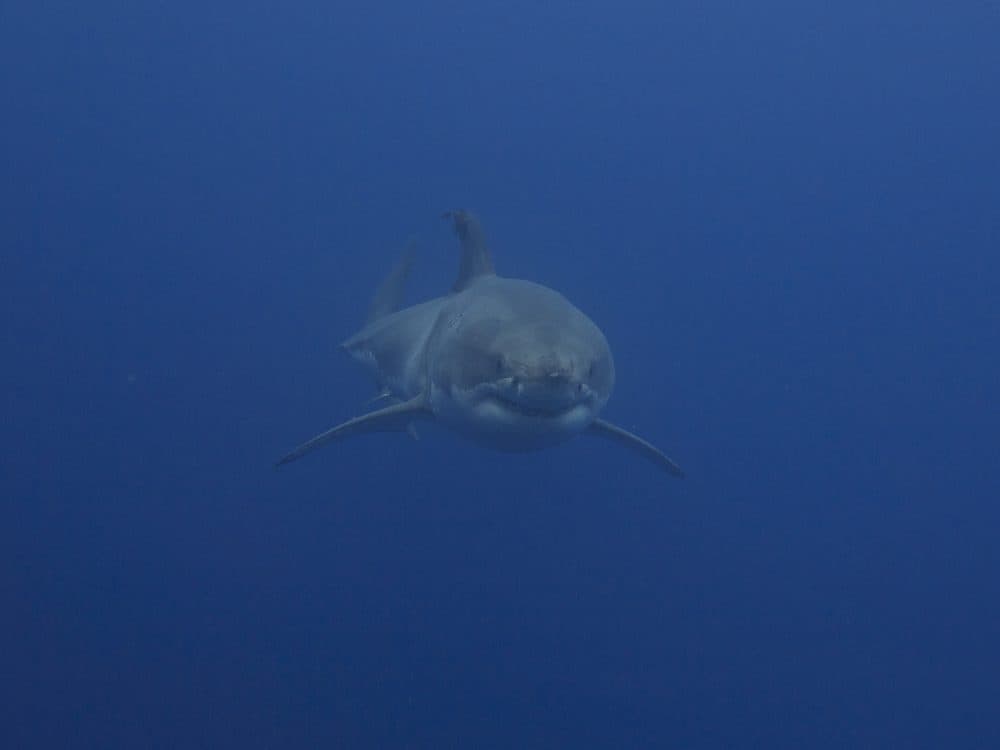Advertisement
Great White Shark Numbers Increasing On Cape Cod
Resume
We're getting close to that time of year, when the great white sharks make their annual visit to the waters of Cape Cod. Cape Cod is the only known aggregating site for white sharks in the North Atlantic.
According to the latest study by the Massachusetts Division of Marine Fisheries, the number of great white sharks vacationing there appears to be rising. That's a public safety issue for towns, according to the state's top shark expert.
Guest
Gregory Skomal, program manager and senior marine fisheries biologist with the Massachusetts Division of Marine Fisheries. His research group tweets @a_whiteshark.
Interview Highlights
On their survey of the numbers of great white sharks
"We are right in the middle of a five-year population study ... what I can tell you ... is how many individuals we've tabulated year for the last couple of years. In 2016 for example, we identified 147 individual white sharks along the eastern shoreline of Cape Cod. The year prior to that, it was 141, and the year prior to that, in 2014, it was about 80. So we're seeing that subtle increase from year to year. And as tempted as I am to say that it's actually an increase in the population size, it's more likely a shift in the distribution of sharks in response to the growing seal population."
On how the seals are attracting sharks
"Most people don't realize the interesting history of the seal populations on the northeastern coast of the U.S. They had been all but drive to extinction a couple of hundred years ago. And now, with protection that was put in place in the early 1970s, we've seen the slow growth in the population that has now resulted in literally tens of thousands of seals along our coastline. And that has drawn the attention of one of their predators, the white shark."
"From a personal and professional point of view, it is remarkable."
Greg Skomal
On the Cape being the only known aggregation site in the North Atlantic
"As a result of the fact that we hadn't had any of these aggregating sites in the Atlantic, we don't know much about this species. Certainly we know a lot in other parts of the world, far more than we know here. So this has provided us the first opportunity with predictable access to this species now, to study the biology of really arguably one of the most charismatic species on earth."
On tagging sharks
"We've tagged over 100 now off the coastline there and it's a bit challenging and exhilarating, very exciting to do. Our objectives there are to look at not only its broad scale movements, where do they go in the winter time, but what's their seasonality around Massachusetts? Where are they in Massachusetts waters? How do they utilize local habitats and what are the environmental factors that are driving it?
[Tagging] is a well-choreographed and orchestrated process. We have a plane in the air ... and he's locating sharks, he's looking for them. Once he finds one, he reports to us on a vessel and we're a team of about four or five people on the vessel ... Once the captain sees the shark, he places the vessel right alongside it and I'm out on the pulpit of the boat, which is the long pointed nose of the vessel. And I'm out there with the tagging pole as well as a GoPro camera.
One of the things we're trying to do is identify individuals. And so when I tell you I've identified 147 individuals in 2016, that's how we know. We actually videotape each shark.
"Each shark is unique -- its coloration patterns, as well as scarring patterns and even injuries that it's sustained over its life that really differentiate it."
Greg Skomal
... I'll place in a tag in it using a long tagging pole and small intramuscular dart that I insert at the base of the dorsal fin. And once that happens it's very exciting."
On how he got into this research
"I grew up in a suburb of New York City, a Connecticut suburb down on Long Island Sound. And I have to admit growing up, I didn't spend a lot of time in that body of water. So much of what inspired me to be attracted to the sea and sharks in general was the works that were coming out from the folks like Jacques Cousteau, the Undersea Adventures of Jacques Cousteau ... The movie 'Jaws,' of course, was inspirational to me. Film called 'Blue Water White Death' that came out just before 'Jaws' did ... And that drove me into really wanted to spend time in the ocean and study its inhabitants and specifically sharks."
On if he's had any close encounters with a great white
"Personally I've not. I'd like to keep it that way."
This segment aired on May 25, 2017.

